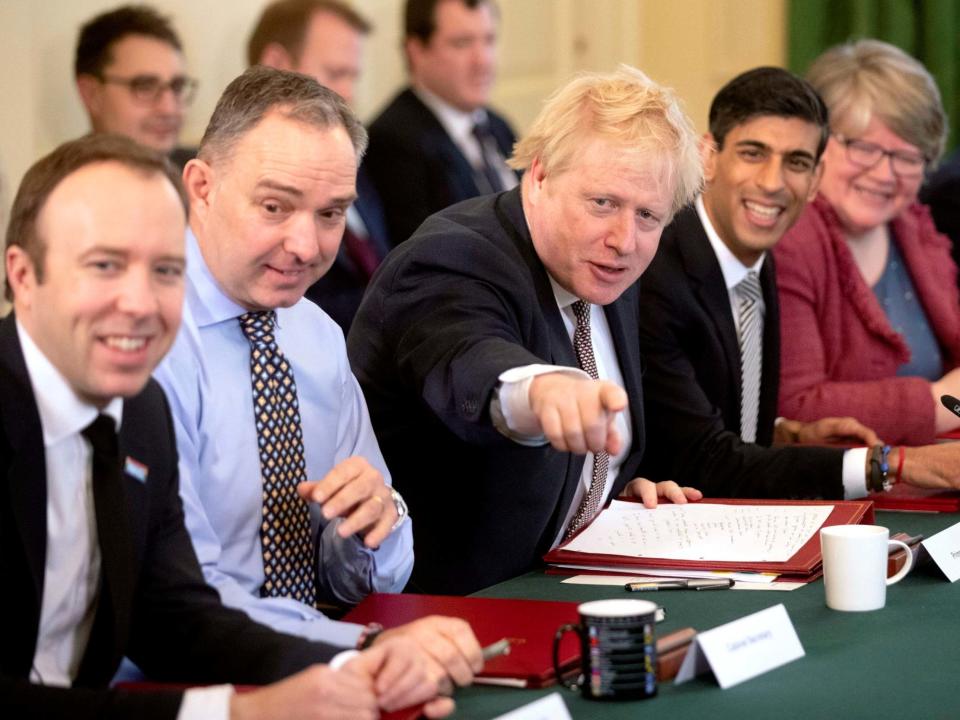Too few women are at the top in government, and it shows in post-coronavirus policy

When lockdown started, I hoped that such a fundamental change in the way we lived our lives could finally be the catalyst we needed to create a more gender-balanced society. A society that better supported women through flexible working and a shift in gender roles at home.
However, it seems I was wrong. The government’s response to Covid-19 has created a situation in which women’s economic security, health and lives are in a worse state than before.
In a cabinet where women make up just 27 per cent of the people around the table, women’s voices in coronavirus policymaking are not as loud as they should be.
And we knew this would happen. In March, former Home Secretary Amber Rudd asked, “Where are all the women?” referencing a complete lack of female MPs in Boris Johnson’s Coronavirus “war cabinet” and now we are seeing the consequences of that lack of representation.
Just a few weeks into lockdown, Refuge reported a 700 per cent increase in calls to its helpline in a day. The Counting Dead Women project estimated that the number of women being killed by a partner or ex-partner had doubled. Charities working to end forced marriage saw a spike in calls during lockdown, with some reporting a 150 per cent increase in calls from teenagers.
These issues existed before the government’s lockdown policy began – lockdown did not create them. However, it seems that a government with a complete gender imbalance forgot that, for some women, being locked-in meant more violence, more abuse and more control. Policy reflects the lives of those who make it. Women must make up at least half of those voices otherwise women’s lives and, in this case, safety, will always be an afterthought.
It seems that little consideration was made for access to women’s sexual health services during Covid-19. One in 10 women and girls aged between 14 and 21 who wanted contraception for a number of essential reasons (which includes wanting to have sex and not get pregnant), have not been able to access their usual form of contraception during the crisis. In May, 77 per cent of GPs had ended or limited the provision of essential sexual and reproductive healthcare services. Access to these women’s health services are essential. When women aren’t at the table, women’s needs go unmentioned and unprioritised, resulting in situations where women cannot access basic health services.
If government reflected society, and its 50:50 gender split, then someone may have mentioned that women need jobs and economic security too. Economically women have been hit hard by Covid policies. Women are likelier to work in sectors that have been shut down by coronavirus than men. Female-dominated businesses such as beauty salons remain under some of the strictest lockdown conditions whilst pubs and certain sport leagues have opened again. The government’s economic recovery plan focuses largely on creating and improving infrastructure and stimulating jobs in construction and engineering. These are historically male-dominated sectors.
Inequality also continues at home. Due to a lack of childcare provision, women have taken on the majority of the domestic chores during the virus. This has resulted in more women cutting their hours or asking to be furloughed than men, impacting career progression and economic security. For women, there seems to be no Covid “bounce back”, just a bounce backwards – not surprising from a Treasury ministerial team where women only make up 16 per cent of it (that’s one female MP by the way).
Representation matters. A government made up overwhelmingly by men has created policies which do not reflect women’s needs. It’s not to say that women haven’t been involved in the government’s Covid response at all. Deputy Chief Medical Officer Dr Jenny Harries played a huge role in providing medical information to the government and to the public, but the representation of women has been generally abysmal. Policy, and in turn women, have suffered because of it.
From the inconvenient to the life threatening, a lack of thought for the realities of women’s lives has resulted in coronavirus policies that make women less safe and less economically secure. A government with a 50:50 gender split is a government more likely to ask, how will these policies affect everyone, including women? That is something that this government has failed to do. Political representation matters, now more than ever.
Izzi Coombes is a campaigner for gender representation in politics and a volunteer for RegistHERtoVote
Read more
Women join together for ‘national scream’ in outrage at gender pay gap
What is the gender pay gap and how is it different from equal pay?
There is inequity even in couples who don't have children

 Yahoo News
Yahoo News 